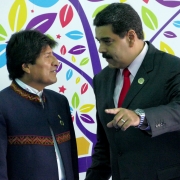As is well known now, Venezuela’s economic situation is dire. There’s no mystery as to what’s happened. Whether one reads the New York Times or the editorial page of the Wall Street Journal, the story is the same: nationalization of industries (oil, most notably) has resulted in an economic crack-up.
That Venezuela’s economy imploded in response to the state expropriating vibrant businesses shouldn’t surprise anyone. Business nationalization is the professional football equivalent of Barack Obama or Donald Trump showing up one day in Foxboro, only to tell New England Patriots owner Robert Kraft that the federal government is relieving him of ownership along with Bill Belichick of his job as head coach. The Patriots are good, by all accounts Belichick designed a masterful game plan on Sunday night, so imagine if either Trump or Obama were to force out football’s greatest mind in order to foist their own visions on the Patriots’ defense.
Government control of business leads to failure not just because those who replace the original owners don’t need to respond to market signals. It mainly fails because the individuals taking over by force generally have no clue about the business they’re taking over.
The Patriots/PdVSA comparison sounds extreme, but it’s really not. The Patriots are the NFL’s gold standard franchise, and PdVSA was at least once one of Venezuela’s most important companies, if not THE most important. In the above imaginary scenario, Obama or Trump take over play calling and personnel for the Patriots (Trump replacing Tom Brady with Don Jr. at QB?), while in the true-to-life scenario of PdVSA, members of Venezuela’s military were handed power. That Venezuela struggles in consideration of what’s taken place (this leaves out the tragic devaluation of the country’s currency, the bolivar) is elementary. Of course it struggles. When you hand over precious resources to individuals lacking any basis for overseeing them, and who will oversee them without having to adhere to market signals, the near, mid and end result is disastrous.
All of which brings us to a recent New York Times opinion piece by Grant Thornton chief economist Diane Swonk. It would be easy to say her rather unfortunate op-ed (“To Avoid a Recession, Start Spending Now”) was a disappointment, but such a comment would ignore that she belongs to a profession that broadly thinks prosperity causes inflation, that the killing, maiming and wealth destruction that is war actually stimulates economic growth, not to mention that the profession is nearly monolithic in its belief that government spending boosts prosperity.
In Swonk’s case, she’s convinced a recession is on the way. Without commenting on whether a downturn is in the offing (most of us can’t measure economic growth on the street we live on, yet Swonk laughably thinks she can divine the growth prospects for the world’s largest economy….) or not, Swonk’s fix for the alleged trouble ahead is government spending. Oh my….
Ok, it should be said up front that an economy is but a collection of individuals, and many of those individuals work for businesses. This matters simply because wise individuals and business generally rush toward their individual “recessions” as a way of fixing bad habits, labor mismatches, shuttering bad investments, bad ideas, etc. This all rates mention as a way of saying that even if our federal minders couldavert a downturn, doing so would be extraordinarily damaging to the U.S. economy. It would be when we remember that recessions are generally the painful but necessary process whereby individuals and businesses fix what they’re doing wrong. That’s why recessions untouched result in booms. The recession is the cure.
Swonk’s economy-sapping cure becomes even more puzzling when it’s remembered why the federal government has trillions at its disposal to begin with. To state what’s rather obvious outside the economics profession, federal spending power (whether the money is taxed or borrowed) is a certain effect of private-sector productivity. Unless Swonk can prove that Congress has access to resources from another planet, its spending power springs from economic growth that already happened. In short, Swonk’s economic prescription, one that would make even the strongest believers in Santa Claus blush, presumes that growth that already took place can be doubled (or more….!) if politicians spend the fruits of it. Swonk’s analysis brings new meaning to double counting, which is odd when we remember that she works for an accounting firm.
To all this, Swonk might respond that government spending can force into action idle economic resources, but to make such a remark would be for the economist to pretend that unspent wealth is generally parked in underground vaults as opposed to bank, savings, and brokerage accounts, not to mention with all manner of other financial intermediaries. This is a long way of saying that contrary to Swonk’s analysis, there’s no such thing as idle resources. Precisely because banks, brokerages and financial intermediaries can’t sit on unspent wealth, so don’t resources remain idle. The effect of “money” that we save is a constant push of resources to their highest use. Government spending logically can’t stimulate, it just signals government stepping in to allocate resources over the market-disciplined private sector.
Which brings us back to the situation in Venezuela. The economy there staggers simply because government has very much usurped the role of private actors when it comes to the allocation of precious resources, and the management/oversight of same. The results, as previously mentioned, were and are easily predictable. Much as father and son might wish otherwise, replacing Bill Belichick and Tom Brady with Donald and Donald Jr. would be disastrous for the Patriots.
Applied to the U.S., it broadly doesn’t have an economy that resembles Venezuela’s mainly because the federal government, while way too big, doesn’t control all the resources always and everywhere produced in the private sector. Still, our federal government does spend $4 trillion per year, and unseen is how much larger and vibrant the economy would be absent this massive mis-allocation. It should boggle the mind. Venezuela expropriates resources very aggressively, and its people starve. Congress expropriates resources in much greater amounts, but as a fraction of the total U.S. economy. Still, imagine where we’d be if the Belichicks of the private economy had more control over what’s precious, and the federal government less thanks to a smaller spending burden. One can fantasize.
For now, let’s just be clear that the government spending Swonk innocently and naively calls for would by definition dampen economic growth for it empowering politicians to replace market actors in directing what’s precious to its highest use. What’s been written should not be construed as an alarmist rant predicting the U.S. morphing into Venezuela anytime soon, but it is meant to convey what’s true: politicians can’t be investors or managers; Venezuela merely an extreme example of what happens when politicians aim to manage the vast majority of an economy.
Rest assured that what doesn’t work in total similarly doesn’t work partially. Swonk owes her employers an explanation. The accountants and auditors in Grant Thornton’s employ could never be as careless toward their clients as their chief economist was toward readers in what is the world’s most important newspaper.












